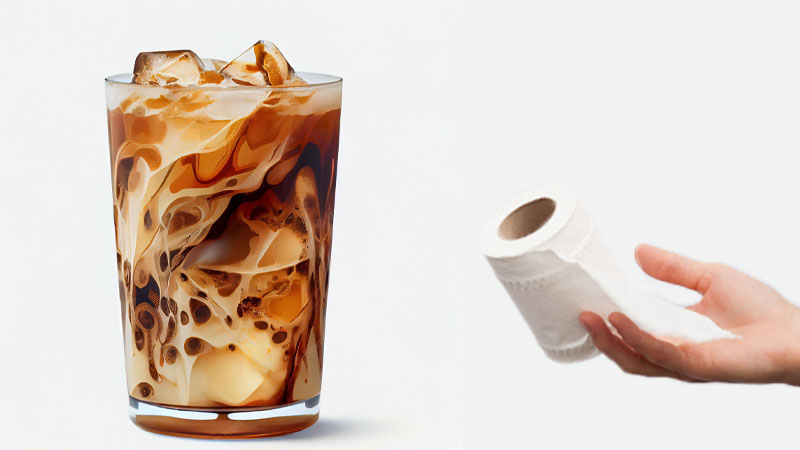Craving caffeine? Everyone loves a good cup of coffee, but have you ever wondered if cold brew and iced coffees can actually make you rush to the bathroom? Well,
it’s true that some people may experience an unexpected boost in bowel movements after drinking a chilled cup of Joe.
So grab your favorite mug, settle in with your laptop, and let’s dive into the science behind does iced coffee make you poop!
Why Caffeine Makes You Poop?
Caffeine, a natural stimulant most commonly found in tea, coffee, and cacao plants, has a unique effect on the digestive system.
Research suggests that caffeine stimulates muscle contractions in the colon and intestinal muscles, somewhat similar to the way the body signals the need for a bowel movement.
Interestingly, this effect is 60% stronger than the response generated by eating a meal, hence the increased urgency to visit the bathroom after consuming caffeinated beverages.
Moreover, caffeine serves as a diuretic, which can also contribute to increased bowel movement. However, individual responses can vary greatly, and not everyone will experience this effect.
How Iced Coffee Affects Your Digestive Health?
Iced coffee offers a refreshing alternative to the traditional hot brew, particularly in warmer climates or during summer.
The same stimulation of colon and intestinal muscles can occur, potentially leading to an increased need for bowel movements.
It’s also worth noting that iced coffee, often consumed in larger quantities due to its refreshing nature, may lead to a higher intake of caffeine, thereby amplifying these effects.
Furthermore, the addition of artificial sweeteners or dairy products to iced coffee can also impact digestion, potentially causing discomfort for those with sensitivities.
What to Do If You Feel Like You’re Going to Have to Go After Drinking Iced Coffee?
If you find yourself needing to rush to the bathroom after consuming iced coffee, there are several strategies you can consider.
First, consider reducing your caffeine intake by diluting the coffee with milk or water, or by opting for a smaller serving size.
Gradually decreasing your caffeine consumption can help your body adjust and potentially reduce its effects on your digestive system.
Second, be mindful of what you add to your coffee. Certain ingredients, such as dairy or artificial sweeteners, can exacerbate digestive issues.
Try switching to non-dairy alternatives or natural sweeteners to see if it makes a difference. Lastly, keep your body hydrated.
Caffeine has diuretic properties that could lead to dehydration, which can further irritate the digestive tract. Drink water regularly throughout the day to ensure your body stays hydrated.
Tips for Avoiding Unnecessary Bathroom Breaks After Drinking Iced Coffee
To minimize unnecessary bathroom breaks after drinking iced coffee, it’s essential to understand and manage your body’s response to caffeine. Here are a few helpful tips:
- Monitor Your Caffeine Intake: Keep track of your daily caffeine consumption not only from coffee but also from other sources like tea, chocolate, soda, and certain medications. Aim to keep it within the recommended daily limit of 400 mg for most adults.
- Timing Matters: Avoid drinking coffee close to bedtime or before any events where access to a bathroom may be limited.
- Try Decaf: If you love the taste of iced coffee but want to limit your caffeine intake, try switching to decaffeinated coffee. It provides the same flavor without the strong laxative effect.
- Listen to Your Body: Pay attention to how your body reacts to different types of coffee and brewing methods. Some people find that cold brew or low-acid coffee is less likely to upset their stomach.
- Maintain a Balanced Diet: Consuming a diet high in fiber can help regulate your bowel movements.
Remember, everyone’s body responds differently to caffeine, so it may take a little trial and error to find what works best for you.
Why Iced Coffee Could Make You Go To the Bathroom?
Aside from caffeine, there are other factors in iced coffee that could contribute to a heightened need for bathroom breaks.
For instance, iced coffee is often served with milk or cream, both of which contain lactose. Some individuals may be lactose intolerant, meaning their bodies lack the enzymes to break down lactose properly, causing symptoms such as bloating, diarrhea, and stomach cramps.
Furthermore, the high acidity in coffee can also stimulate the production of gastrin, a hormone responsible for speeding up activity in the colon.
This could lead to increased bowel movements. Additionally, artificial sweeteners often used in iced coffee can have a laxative effect, especially when consumed in large quantities.
Lastly, iced coffee is typically consumed at a faster rate than hot coffee due to its refreshing nature, which could potentially lead to faster digestion and subsequently, a quicker trip to the bathroom.
Tips for Making Delicious, Poop-Free Iced Coffee at Home
To enjoy a delicious, poop-free iced coffee at home, consider these tips:
- Choose Low Acidity Coffee: Some coffee beans naturally have lower acidity, which may be easier on your digestive system. Cold brewing also reduces acidity levels.
- Opt for Non-Dairy Creamers: If lactose causes you digestive troubles, consider using non-dairy milk alternatives like almond, oat, or soy milk.
- Be Careful with Sweeteners: Artificial sweeteners can be hard on the stomach. Opt for natural sweeteners such as honey or maple syrup, or enjoy your iced coffee unsweetened.
- Monitor Your Caffeine Intake: Not all coffee beans have the same caffeine content. Try a lower-caffeine bean or mix regular and decaf beans to control your caffeine intake.
- Hydrate: Always remember to drink water alongside your iced coffee to prevent dehydration, which can stimulate bowel movement.
Experiment to find the perfect balance for your body and taste buds, and enjoy a refreshing iced coffee without the worry of an unwanted bathroom break.

